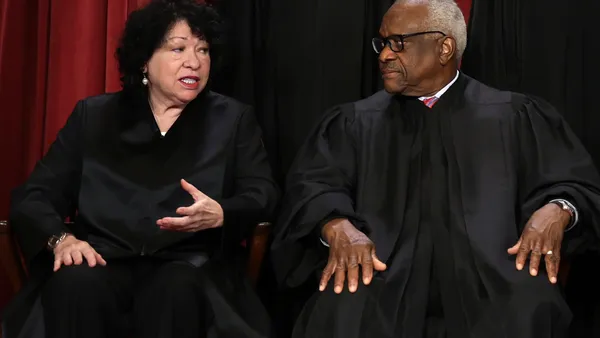Dive Brief:
- Employers run afoul of federal law when they fire someone for not disclosing a disability during a job interview or for waiting until after they were hired to ask for an accommodation, the U.S. Equal Employment Opportunity Commission warned in a May 21 lawsuit.
- Per the complaint in EEOC v. All Day Medical Care Clinic, LLC, on her first day of work, a scheduling assistant for a Maryland-based healthcare provider notified the CEO she had a vision impairment and needed a magnifier and Zoomtext software as an accommodation. The CEO allegedly advised her that things would have been different if she’d mentioned her disability and accommodation needs during her interview and told her to leave, according to court documents.
- The EEOC sued the healthcare provider for allegedly violating the Americans with Disabilities Act. Under the ADA, “job applicants do not need to reveal their disabilities before being hired,” Debra Lawrence, regional attorney for the EEOC’s Philadelphia district office, explained in a press release. “When an employer penalizes an employee for not raising issues of disability and reasonable accommodation, it is requiring the employee to reveal information the employee legally does not have to divulge,” Lawrence said. All Day Medical Care did not respond to a request for a comment prior to press time.
Dive Insight:
Hiring practices involve a number of ADA-related compliance issues, and the lawsuit offers a few takeaways on what to look out for.
First, employers should remember that the ADA generally prohibits them from considering an applicant’s disability when making a hiring decision, an EEOC guidance states.
There are limited exceptions, such as in an EEOC example in which a small repair company wants to fill a carpenter position that requires the use of power saws and other dangerous equipment.
In that scenario, the company could refuse to hire an applicant with narcolepsy, which causes her frequent and unexpected loss of consciousness, if there is no reasonable accommodation that would limit or eliminate the risk of harm, the EEOC says.
The job interview is a second area potentially ripe for slip-ups. Last month, restaurant chain operator GMRI, Inc., doing business as Olive Garden, agreed to pay $30,000 to settle an EEOC lawsuit alleging that a general manager asked illegal questions to an applicant interviewing for a busser position.
According to the lawsuit, the manager asked the applicant about his use of a cane to walk, what was “wrong with” him and how “bad” his disability was. The manager then allegedly ended the interview, and the restaurant declined to hire him because of his disability, the EEOC alleged.
It’s for this reason — to guard against employers unlawfully considering an applicant’s disability in the selection process — that the ADA generally prohibits them from asking disability-related questions until after the applicant has been given a conditional job offer, another EEOC guidance explains.
However, some inquiries are allowed. For instance, before making a job offer, employers can ask an applicant if they will need an accommodation to perform a specific duty, the EEOC points out.
The All Day Medical Care lawsuit highlights a third area for mistakes: When an employee raises issues of reasonable accommodation, “an employer must engage in the interactive process,” Lawrence said.
An EEOC enforcement document describes this as “an informal process to clarify what the individual needs and identify the appropriate reasonable accommodation.” As part of the process, employers can ask questions that will let them make an informed decision about the request, including what type of reasonable accommodation is needed, the document says.
Here, after the CEO told the scheduling assistant to leave, her caseworker contacted the CEO and offered to install and pay for the requested software, but the CEO continued to refuse to provide an accommodation, the EEOC alleged.
The scheduling assistant also tried to phone and text the CEO but received no response. Instead, the company allegedly violated the ADA by refusing to provide her with a reasonable accommodation and by terminating her because of her disability and to avoid accommodating her, the EEOC said.












